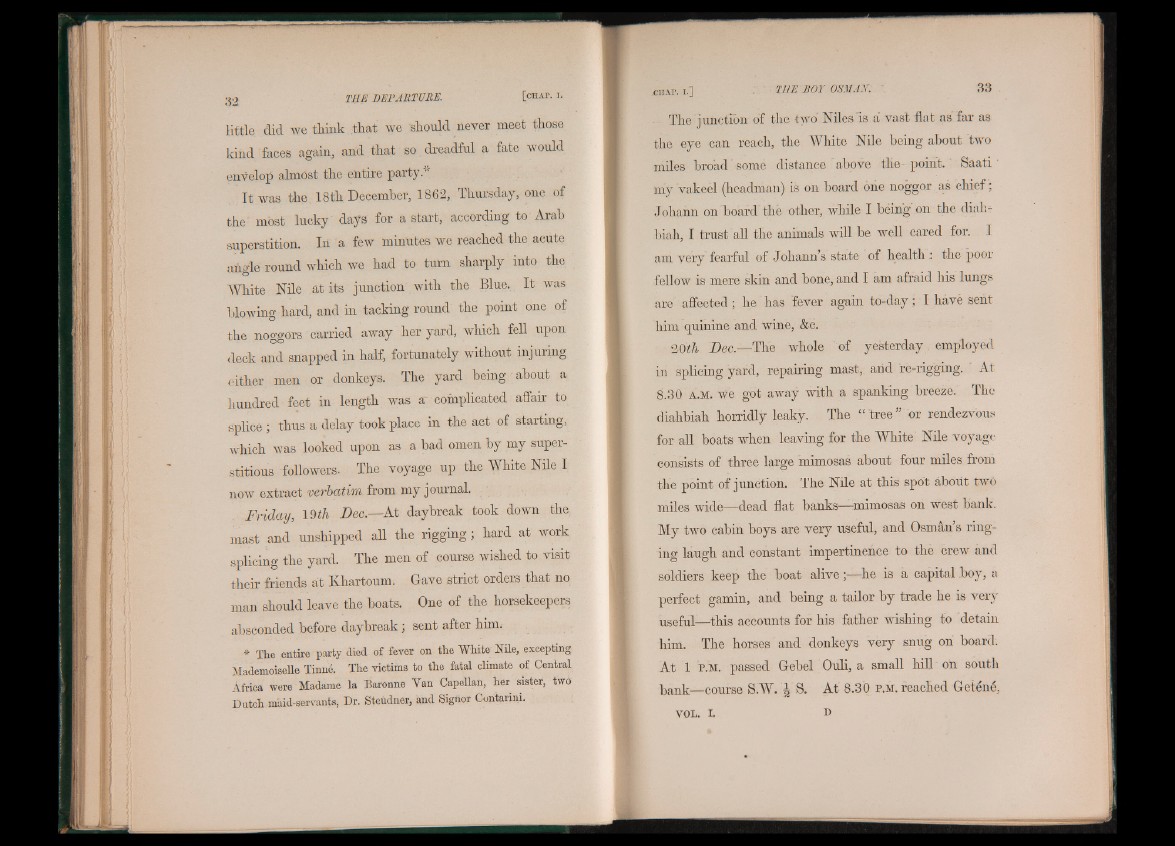
little did we think that we should never meet those
kind faces again, and that so dreadful a fate would
envelop almost the entire party."1
I t was the 18th December, 1862, Thursday, one of
the most lucky days for a start, according to Arab
superstition. In a few minutes we reached the acute
an ale round which we had to turn sharply into the
White Nile at its junction with the Blue. I t was
blowing hard, and in tacking round the point one of
the noggors carried away her yard, which fell upon
deck and snapped in half, fortunately without injuring
either men or donkeys. The yard being about a
hundred feet in length was a~ complicated affair to
splice ; thus a delay took place in the act of starting,
which was looked upon as a bad omen by my superstitious
followers. The voyage up the White Nile I
now extract verbatim from my journal.
Friday, 19 th Dec.—At daybreak took down the
mast and unshipped all the rigging; hard at work
splicing the yard. The men of course wished to visit
their friends at Khartoum. Gave strict orders that no
man should leave the boats. One of the horsekeepers
absconded before daybreak ; sent after him.
* The entire party died of fever on the White Nile, excepting
Mademoiselle Tinne. The victims to the fatal climate of Central
Africa were Madame la Baronne Yan Capellan, her sister, two
Dutch maid-servants, Dr. Steudner, and Signor Contarini.
The junction of the two Niles Is a vast flat as far as
the eye can reach, the White Nile being about two
miles broad some distance above the- point. Saati
my Vakeel (headman) is on board one noggor as chief ;
Johann on board thè other, while I béin'g on the diah-
biah, I trust all the animals will be well cared for. I
am very fearful of Johann’s state of health .: the poor
fellow is mere skin and bone, and I am afraid his lungs
are affected ; he has fever again to-day ; I hâvé sent
him quinine and wine, &c.
20 th Dec.—The whole of yesterday. employed
in splicing yard, repairing mast, arid re-rigging. At
8.30 A.M. we got away with a spanking breeze. The
diahbiah horridly leaky. The “ tre e ” or rendezvous
for all boats when leaving for the White Nile voyage
consists of three large mimosas about four miles from
the point of junction. Thé Nile at this spot about two
miles wide—dead flat banks—mimosas on west bank.
My two cabin boys are very useful, and Osmân’s ringing
laugh and constant impertinence to the crew and
soldiers keep the boat alive;—he is a capital boy, a
perfect gamin, and being a tailor by trade he is very
useful—this accounts for his father wishing to detain
him. The horses and donkeys very snug on board.
At 1 p.m. passed Gebel Ouli, a small hill on south
bank—course S.W. I S. At 8.30 p.m. reached Geténé,
VOL. I. D